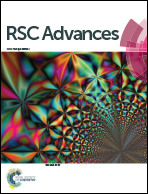Zeolite based solid-phase extraction coupled with UPLC-Q-TOF-MS for rapid analysis of acetylcholinesterase binders from crude extract of Corydalis yanhusuo†
Abstract
A very convenient, sensitive and precise solid-phase extraction approach was established for extract and analysis of acetylcholinesterase binders from crude extract of Corydalis yanhusuo. This approach was based on the retention of binders by acetylcholinesterase immobilized zeolite. The retained acetylcholinesterase binders were eluted and analyzed by ultra-high performance liquid chromatography and quadrupole-time-of-flight mass spectrometry. The powder X-ray diffraction (XRD), transmission electron microscopy (TEM), and Fourier transform infrared (FT-IR) spectroscopy techniques were employed for the characterization of acetylcholinesterase immobilized zeolite. Some experimental conditions such as incubation temperature, time, buffer pH and ion strength, which may affect binding capability, were investigated by using coptisine as a model inhibitor. The optimal incubation conditions were as follows: wash times: 4, wash solvent: 50% methanol–water, incubation time: 20 min, temperature: 37 °C, ion strength: 10 mM, pH: 7.4. The proposed approach was successfully applied for the extraction of acetylcholinesterase binders from crude extract of Corydalis yanhusuo. These binders were further validated by acetylcholinesterase inhibitory assay. Fourteen acetylcholinesterase inhibitors were identified, and ten of which, including dehydrocorydaline, allocryptopine, corydaline, dehydroglaucine, protopine, tetrahydrocoptisine, tetrahydropalmatine, corynoline, tetrahydrocolumbamne and tetrahydroberberine, were reported for the first time. In addition, the merits and shortcomings of zeolite based solid-phase extraction approach were compared with that of magnetic nanoparticles based solid-phase extraction approach.


 Please wait while we load your content...
Please wait while we load your content...